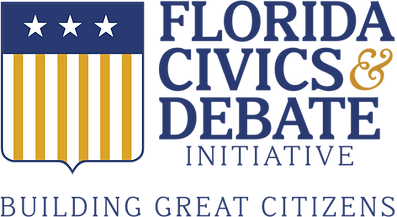LET'S GET STARTED
Debate can be offered as an extra-curricular activity or a co-curricular activity where students on the team also take debate class. The co-curricular model gives students more time to prepare and coaches more time to work with individual students. If a co-curricular model is not practical in the first year, schools are encouraged to add a debate class the second year.

BECOMING
A COACH
A DEBATE COACH DOES NOT:
-
A debate coach does not need to have a background in debate but must be willing and eager to learn new things.
-
A debate coach does not have to be a civics teacher.
A DEBATE COACH SHOULD:
-
A debate coach should have some foundational knowledge and be able to direct students to seek a deeper knowledge and understanding.
-
The ideal debate coach will guide and encourage students to overcome their fear of public speaking.
-
New coaches can expand their civics knowledge by participating in professional development or on their own.
"
"
My personal success was seeing some of my shy students in the beginning shine as they got more confidence.
- ARCHIE BARRON, FCDI COACH
WHAT ARE THE
COMPETITIVE EVENTS?
Most tournaments offer between 8-10 different competitive events. Coaches may consider offering only a few options when they first begin coaching, or they may offer all the events. A complete list and description of these events is included in the Appendix.
Events are divided into three main categories: debate, speech and legislative.
There is also one “hybrid” event.
DEBATE
EVENTS
Students who compete in the debate events argue both sides of an issue. Academic debate is an intellectual activity and is not about personal advocacy. Students may compete in different debate events as individuals, pairs or in teams of 3-5
SPEECH EVENT
Speech events often appeal to students who want to express their ideas but without the back-and-forth clash of debate. Different speech events require students to memorize and deliver other speeches, to write and memorize their own speeches, or to perform advanced research with limited time to prepare and deliver an extemporaneous speech.
LEGISLATIVE
DEBATE
There is also a hybrid event called Legislative Debate. Students role play members of Congress. They write legislation and debate during a mock legislative session.

RECRUITMENT
Many teams start small and grow larger through a natural process. Students’ success and accomplishment in debate competition can become contagious. New students are motivated to join the team as they see debate team students improve their communication skills and become more confident.
Proven recruitment techniques include:
-
Adding team information to the school website.
-
Distributing digital and hard copies of recruitment flyers.
-
Participating in club rush or back to school rights.
-
Taking recommendations from other teachers, coaches and counselors.

TEAM CULTURE & LEADERSHIP
-
The debate coach and team leaders must work together to establish a strong team culture. The debate community represents a team’s character and reputation. Respected programs usually value education and personal growth over competitive success.
-
Develop a motto or slogan that best represents the team’s values, such as “Leadership is Service” or “Commitment to Excellence.”
-
Plan for growth by adding officers and leadership positions to reward effort and distribute the work.
-
Be organized and efficient. Know and adhere to deadlines to register for tournaments. Know the rules of the events and be sure the students know them. Be aware of the content of the pieces the students are performing as each performance is a reflection of the team.
-
Be polite and courteous, and do not denigrate a judge. Remind the students that even when they disagree with a judge’s decision, all judges are volunteers and are doing their best. Losing a round is an opportunity to grow and become stronger next time. There will be times when the students are frustrated and need to vent. Devise a means for them to communicate their frustrations to leadership.

FINANCES
-
Debate team expenses include league membership fees, tournament registration fees, tournament transportation costs, and supplemental resources.
-
Team start-up costs vary depending on how many students are on the team and the number of tournaments in which the team competes. For example, a team of 10 students who competes in five regional competitions a year can expect to spend approximately $1,000.
-
Schools participating in the FCDI have their costs covered, such as travel and resources.
-
Work closely with the school bookkeeper to understand all financial rules and policies.
-
Establish a fundraising plan.
-
Consider a student team fee that might include a team t-shirt.

PARENTS
-
Parents are crucial team supporters.
-
Schedule a parents’ organizational meeting at the start of the year. Gather complete contact
information for all parents.
-
Recruit interested parents to judge, chaperone and help host tournaments.
-
Recognize and praise parents who contribute greatly to the team.

CELEBRATE
-
Communicate team successes to the school and community by publishing results and pictures on approved social media.
-
Display trophies and medals in the classroom.
-
Have an end-of-season party with awards.
-
Invite an elected or public official to commend the team’s hard work and performance.
